Baby boomer travel

South America is not out of reach for travelers with disabilities. Photo from riodejaneiro.com
Continuing our series on traveling with a medical condition — written by British freelance journalist Laura Miller — we’ll focus today on traveling with a disability.
If you missed Laura’s first post in the series, you can read her top tips for traveling with a medical condition here.
Laura provides a wealth of tips and advice that I’m sure many baby boomer travelers — and their traveling partners — will find helpful and reassuring.
By Laura Miller
In today’s world, travel isn’t restrictive. Regardless of whether you’re fit and healthy, have a physical impairment, learning disability, or any other condition, there’s no reason to avoid traveling.
You can visit even the most exotic of destinations: from South America to Southampton, a disability shouldn’t stop you from seeing the world.
Here’s how:
Planning… Continue reading

A Malaysian medical team at work; if you carry your medical ID, they’ll know how to treat you
With the oldest baby boomers now in their early seventies and the youngest in their early fifties, traveling with medical conditions has become a major issue for the baby boom generation.
British freelance writer Laura Miller has compiled a practical guide to coping with medical conditions while on the road (or in the air, on the water, etc.), so that all of us with medical issues can enjoy our travels to the utmost.
Her guide is long enough that I’ll be running it over the course of several posts, so stay tuned for more. My thanks to Laura for providing us access to this important series.
By Laura Miller
Having a chronic or serious medical condition doesn’t mean you can’t travel safely — but you will need to take… Continue reading
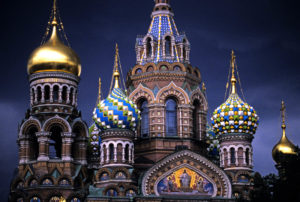
St. Petersburg, Russia: can be visited without a visa. Photo by Dennis Cox/WorldViews
Note: This is the sixth in a series of Baby Boomer Travel Guides and the fourth in the series focusing on transportation options around the world. Please go here, here, and here for the previous posts.
Scandinavia and the Baltic States compose far Northern Europe (we’ll cover Germany, The Netherlands, and some other northern European countries in a subsequent post), and feature some of the best scenery, most sparsely populated spaces, and lively yet historic cities in Europe.
Ships and trains offer the most convenient and comprehensive forms of transportation here, but driving among some of the countries is certainly doable.
And Denmark, especially, is well-suited to biking, with plenty of bike paths and flat terrain.
Getting Around The Baltics
The Baltic region is excellent for cruising because the main ports — Oslo,… Continue reading
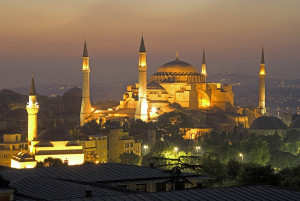
Hagia Sophia (Church of the Holy Wisdom) at dawn in Istanbul, Turkey. Photo by Dennis Cox/WorldViews
Note: this is the fifth in a series of Baby Boomer Travel Guides. In our last post, we looked at the options for seeing the Caribbean. Today we focus on means of transport around the Mediterranean Sea.
When traveling around the Mediterranean region, you have a full range of options: taking a cruise ship or ferry boat, driving, taking trains, or flying between destinations.
(If you’re on a guided tour, you’ll most likely be traveling by bus, though other forms of transport may figure in as well.)
How you choose to get around this endlessly fascinating area is one of the biggest decisions you’ll make — maybe the biggest decision — regarding your Mediterranean trip. It will color your entire experience — for the better, we hope.
Each mode of transport has its… Continue reading
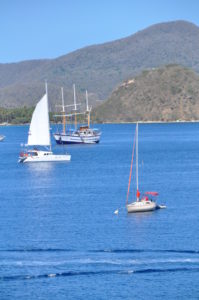
Terre de Haute, Iles des Saintes in the French Caribbean, is an idyllic spot open only to small ships. Photo by Catharine Norton
For your next trip, should you take a cruise, a train, a plane, drive a car — or try something different, like taking a cargo ship or long-distance passenger ferry?
That depends to a large degree on where you’re going and what kind of travel experience you hope to have. Different areas of the world — as well as differing expectations — lend themselves to different forms of transportation.
In this series, we’ll take a look at different options for getting around various areas of the world — starting with the Caribbean.
Navigating The Caribbean
This one is easier than most, or so it seems at first glance.
If you’re headed to one island in search of a beach resort or some cultural… Continue reading
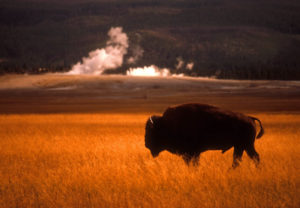
Bison roam Yellowstone National Park. Photo by Dennis Cox/WorldViews
National Travel & Tourism Week, which runs this year from May 7-13, is a time to celebrate the impact that travel and tourism have on the U.S. economy.
And it’s huge. According to the U.S. Travel Association:
- In 2016, domestic and international travelers spent a combined $683 billion on leisure travel in the U.S. When you add in business travelers, the total is almost $1 trillion — some $31,500 spent per second.
- That same trillion-dollar spending generated $2.3 trillion in total economic output in the U.S., factoring in an additional $1.3 trillion spurred in other industries, such as retail.
- The travel industry supports 15.3 million American jobs — 8.6 million directly in the travel industry and 6.7 million in other industries.
- One of every nine jobs in the U.S. is dependent on the… Continue reading
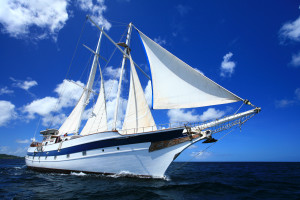
The Diamant, Island Windjammers’ 12-passenger sailing ship. Photo from Island Windjammers
How you get to where you’re going can be just as crucial to the success of your trip as the destination itself.
And in some cases, the mode of transport is, in effect, the destination.
Ocean cruises are an obvious example of the latter.
When you choose to see the world by cruise ship, you’re committing yourself to spending most of your time at sea and limiting your sightseeing on land to ports or places that are within a few hours’ drive by tour bus, taxi, or rental car from the ports.
But ocean- and sea-going vessels come in many shapes and forms — from small sailing ships to floating behemoths — that can make for entirely different journeys themselves.
Or say you want to take the Trans-Siberian Express (train) from China to… Continue reading

The Garden of Earthy Delights, by Hieronymus Bosch
If you have a passionate interest in a particular topic — it could be just about anything — you’re a prime candidate for theme travel.
In my younger days, I was obsessed by the paintings of the 15th-century Flemish fantasist Hieronymus Bosch, and trekked all over Europe attempting to see every one of them; I fell a little short, but had a wonderful time and my dedicated purpose gave my journey added meaning.
I was traveling by myself, but theme travel often involves going with like-minded people who share your passion. Take theme cruises, for instance.
The Lure of Theme Cruises
For six years I wrote a regular theme cruise column for Porthole Cruise Magazine, which chronicled the adventures of folks who are crazy about the most wide-ranging subjects imaginable:
Birding cruises….mah jongg cruises…vegan cruises…vampire cruises…marathon (running)… Continue reading
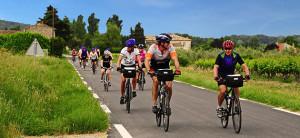
Active travel like this European bike tour is loaded with health benefits for boomers
Most of us probably don’t travel for our health — but generally speaking, it’s a very good perk, especially for baby boomers.
Studies have shown that leisure travel can be good medicine.
There’s straight-up wellness travel, of course, such as visiting a health spa to lose weight.
But travel in and of itself can also do the job.
Here’s why:
- Travel helps reduce stress and promote relaxation by taking a break from routine.
- Travel usually results in greater physical activity, particularly walking. But you might also learn tai chi in China, practice yoga in India, or bicycle around Europe.
- Travel promotes brain health by challenging us with new and different experiences and environments. It can potentially help ward off dementia and Alzheimer’s.
- Travel can also help ward off depression… Continue reading

Dutch tulips: better than cave biking. Photo by Rachel Kramer on flickr.
According to a recent survey of 40 countries around the globe conducted by motor home rental site SHAREaCAMPER, the Netherlands has the most adventurous people per capita, followed by Australia and Sweden.
The survey tabulated the number of online searches in each country for such adventurous activities as skydiving, bungee jumping, hiking, rock climbing, skiing, surfing, BMXing, and caravanning — the latter being what Australians (where SHAREaCAMPER is partially based) call traveling in RVs, campers, or motor homes.
Strictly in terms of sheer numbers of total searches, the United States placed first, but of course has a much higher population than the other countries. The U.S. finished ninth in the per capita rankings.
While the Netherlands was outdone in skiing by Norway and Australia in surfing (no surprises there), Switzerland in… Continue reading








